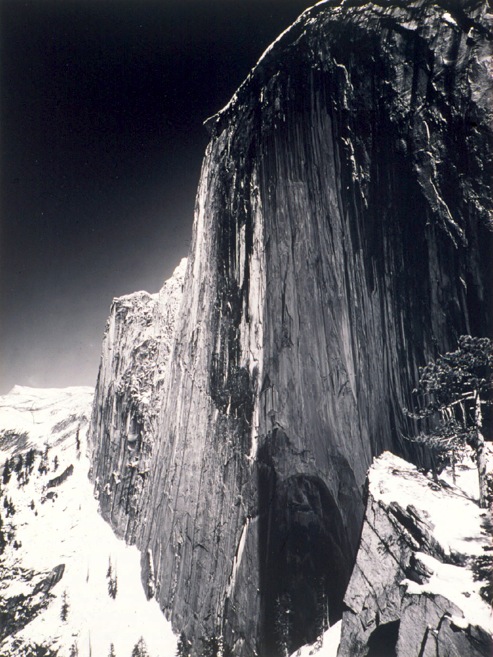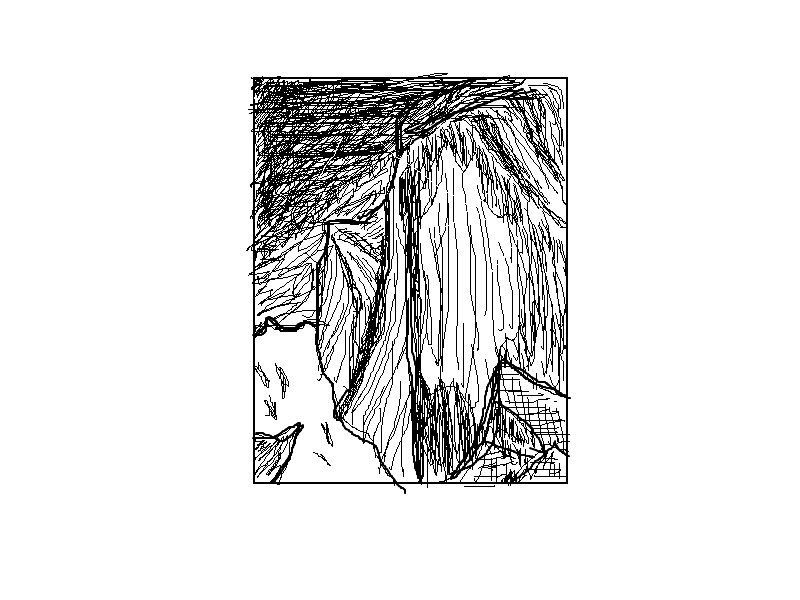Introduction
The work selected for the analysis in the current paper is the piece by Ansel Adams titled Monolith, the Face of Half-Dome. Ansel Adams is famous as a skillful photographer, and the work under analysis is the photo by this artist that he created in 1927. This piece of art of photography was observed in the San Jose Museum of Art during the currently held exhibition titled Ansel Adams: Early Works (SJMA, 2009). The general characteristics of the selected photo by Ansel Adams include its black-and-white color gamma and nature as its main topic.
Piece of Art
Subject
To start the analysis, it is necessary to note that the photo by Ansel Adams is a piece of representational art (Sayre, 2003, p. 198). The subject of the photo is the mountain landscape shoot from the lower position, which increases the height and the volume of the represented mountain half-dome. Although photo cannot be called a new medium for art presentation, it is still an impressive way to depict the natural landscape and praise the beauty of nature. The portrayal of nature is a typical subject for the works by Ansel Adams (AAG, 2009).
Content
The essence of the content of the chosen photo is the appraisal of nature, its beauty, and its greatness. The Monolith, the Face of Half-Dome makes a strong impression on the spectators, and the major idea that one can have while observing the photo by Ansel Adams is that a human being is not the master of the world that can subdue nature, but only a small element of the latter’s huge whole. Drawing from this, the major intention of the photo is to show the contrast between what people can think of their role in the world and the actual role compared to the greatness of mountains. The implications that lead to such a conclusion include the already mentioned shooting technique, as the photo looks as if shoot intentionally from below to increase the effect produced by the mountain image. As well, Ansel Adams skillfully incorporates the background imagery in the photo and catches the minor images of trees to better contrast the large and the small, the sufficient and the minor in the photo, and nature as such. The title of the photo, Monolith, the Face of Half-Dome, also stresses the strength of nature and adds to the breathtaking effect the piece produces on its spectators.
Formal Analysis
Line
As the piece of art selected for the current paper consideration is a photo, the two most important components of the formal analysis that can be applied to it include the Line and Color (Fry, 2009). Thus, Ansel Adams uses mainly the straight line in this work of art. The image is reflected in a vertical position which, combined with the naturally-created lines observed on the mountain surface, increases the feeling of the mountain greatness at the moments of observation and deeper analysis.
Color
Color is another special point about analyzing photography, as color helps render the hidden and implicit meanings of the image (Fry, 2009). What differs Ansel Adams’ works from the variety of others is that he uses shoots only in black-and-white as if relying more on the interplay of the light and shadow than on the color palette of the image displayed. Therefore, the photo analyzed is black-and-white which allows a better understanding of the depth of the sky and the actual height of the portrayed mountain.
Media
Medium
As mentioned multiple times above, the piece analyzed is a photo, and therefore the medium used for its creation is the photo paper and silver gelatin print (SJMA, 2009). A medium is a traditional form of art with a long history. Although the color photo was invented several decades ago, still black-and-white photo shooting is preferred by the most reputable artists in this area of activity (AAG, 2009). The use of the silver gelatin print allows the photo to be in perfect condition even though it was shot back in 1927.
Technique
The technique Ansel Adams used for creating this photo is a professional photo-shooting technique and the photo production technique involving the use of the vintage silver gelatin print process (SJMA, 2009). This technique provides for the clarity of the image and the opportunity to observe even the minor details of the landscape portrayed. Accordingly, the medium and the technique used allow Ansel Adams to represent the real objects as they can be observed in nature because photography is one of the art forms that are the closest ones to reality.
Context
Significance
The significance of the selected work for modern art is obvious from the simple fact that photo is one of the dominant forms of contemporary art and the topic of nature portrayal is especially important in the context of the current environmental issues. Seemingly, these reasons drove the San Jose Museum of Art curator to include the photo in the Ansel Adams exhibition and launch the exhibition of this artist on the whole.
Function
The function of the Monolith, the Face of Half-Dome in the modern culture and society has experienced the transformation compared to the function this piece of art had in the 1920s. As mentioned above, today environmental concerns are crucial for mankind, and the works like Monolith, the Face of Half-Dome help create a better perception of nature by the modern people. It can be assumed that in the society of the 1920s this photo rather carried the function of the promoter of the photo art and the artistic talent of its author, Ansel Adams.
Piece of Art Sketch
The following images present the actual photo image of the analyzed piece of art and the required sketch of the photo (Figures 1and 2 respectively):


Conclusion
Thus, the photo by Ansel Adams titled Monolith, the Face of Half-Dome is a perfect example of the art of photography as one of the main directions of the contemporary art development. After the artistic characteristics and implications of the work are considered, it is now possible to state that the author managed to achieve the desired effect of the photo as currently this piece of art is exhibited in the San Jose Museum of Art being the part of the exhibition titled Ansel Adams: Early Works. This fact is the recognition of the author’s talent and of the work’s ability to achieve its intended effect and carry its intended function in society.
Works Cited
AAG. “The Ansel Adams Gallery.” Representing the Work of Ansel Adams and Select Landscape Photographers (2009). Web.
Fry, Robert. “Formal Analysis.” Writing About Art (2009). Web.
SJMA. “San Jose Museum of Art.” Official Web Site (2009). Web.
Sayre, Henry. A World of Art. Prentice Hall, 2003. Print.